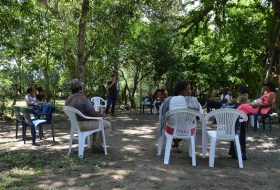News
Unicauca starts a research project on socio-ecological management in El Patía
The project led by Professor Luis Antonio Rosas of the Research Group for Rural Development - TULL will be developed based on the comprehensiveness of Participatory Environmental Management to promote the empowerment of Afro-patian women for their territory, management and conservation of biodiversity to through agro-ecological practices.
Last Tuesday, February 23, in the village of El Puro in the municipality of El Patía, in front of leading women representatives of the organizations Association of Women Entrepreneurs and Managers for Development in Plan del Patía ASOMEPLAN, Association of Women of Mulalo and the Association of Murupacha Women, the socialization of the Project "Processes of territorialization of Afropatian women in the face of water management and the defense of food sovereignty" was carried out, which will be coordinated by Professor Luis Antonio Rosas assigned to the Department of Intercultural Studies and member of the Group Research for Rural Development - TULL.
The project was selected from 38 proposals that were submitted to the third version of the WWB Colombia Foundation for Research Fund, in which national and foreign research groups, master's students, and doctoral students from the country participated. The initiatives presented for this call entitled "Contexts and opportunities for entrepreneurship of women in rural areas", aimed to understand the dynamics, tensions, imaginaries, relationships, challenges, conflicts and current possibilities in rural spaces in relation to entrepreneurship led by or with the participation of women in Valle del Cauca and Cauca.
The initiative will be developed based on the comprehensiveness of Participatory Environmental Management in such a way that it promotes the empowerment of Afro-patian women for their territory, management and conservation of biodiversity through agro-ecological practices to affirm food sovereignty and autonomy as alternative processes of resistance, build networks and agendas that allow the implementation of public policies for the sustainability of the process. (Women, community, CRC, mayor's office, social organizations, among others).
For María Ibarra, female leader and legal representative of ASOMEPLANP “this project will allow us to advance leadership and empowerment processes with respect to participatory environmental management focused mainly on the conservation and protection of water, in addition to the food insecurity that occurs in the region, aspects of great importance in the community agenda of us Afropatian women ”.
Professor Luis Antonio Rosas, who is carrying out PhD studies in Environmental Sciences, argued that the project proposes a more inclusive and participatory vision in the preparation of the socio-environmental management plan of the region, in such a way that it integrates a set of programs, actions and strategies aimed at guaranteeing that the predominant common goods in the area are used in a reasonable way with actions that favor the transition towards sustainability.
“It is necessary to promote sustainable territorial management through the analysis of the socio-ecological processes that Afropatian women develop in their territory, in such a way that it responds to ethnic, historical, cultural and gender specificities, which takes into consideration traditional practices of production, which attends to the relationships established by the Patian community with nature and promotes its economic and social development”, he concluded.
More Info:
Research Group for Rural Development - TULL
Email: tullrural@unicauca.edu.co


